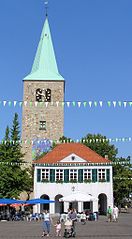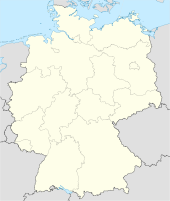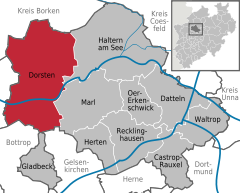- Dorsten
-
Dorsten Historical town hall and St. Agatha cathedral 
Coordinates 51°39′36″N 6°57′51″E / 51.66°N 6.96417°ECoordinates: 51°39′36″N 6°57′51″E / 51.66°N 6.96417°E Administration Country Germany State North Rhine-Westphalia Admin. region Münster District Recklinghausen Mayor Lambert Lütkenhorst (CDU) Basic statistics Area 171 km2 (66 sq mi) Elevation 74 m (243 ft) Population 76,775 (31 December 2010)[1] - Density 449 /km2 (1,163 /sq mi) Other information Time zone CET/CEST (UTC+1/+2) Licence plate RE Postal codes 46282, 46284, 46286 Area codes 02362, 02369, 02866 Website www.dorsten.de Dorsten (German pronunciation: [ˈdɔʁstən]) is a town in the district of Recklinghausen in North Rhine-Westphalia, Germany and has a population of just below 80,000.
Dorsten is situated on the western rim of Westphalia bordering the Rhineland. Its historical old town lies on the south bank of the river Lippe and the Wesel–Datteln Canal and was granted city rights in 1251. During the twentieth century, the town was enlarged in its north by the villages of the former Herrlichkeit Lembeck. While Dorsten's northern districts are thus shaped by the rural Münsterland with its many historical castles, just south of the town the Ruhr region begins, Germany's largest urban agglomeration with more than seven million inhabitants.
The exact linguistic derivation of the word “Dorsten” is unknown, leaving the meaning of the town’s name unclear.
Contents
History
Archaeological findings show that the area was already populated during the Neolithic and Bronze Ages, from about 4000 BC onwards. The Romans established a military camp in Dorsten-Holsterhausen in 11 BC and Varus passed through it in 9BC on his way to the Battle of the Teutoburg Forest.
From around 700 AD onwards, the Archbishopric of Cologne began to evangelise the area around Dorsten. Archbishop Konrad von Hochstaden, together with the Count of Cleves, granted Dorsten the city rights in 1251. Due to its economically favourable position on the river Lippe, the town became a member of the Hanseatic League of international trading cities and turned into the richest town in the Vest Recklinghausen.
In 1488, Franciscan monks established a monastery which continues to exist today as the world’s oldest permanently existing cloister of this order. The monks founded Gymnasium Petrinum in 1642 and in 1699 the Ursulines set up a cloister including a boarding school for girls. However, the Thirty Years’ War (1618–48) and the continuous occupation by various forces badly derogated Dorsten’s medieval wealth.
It was only during the Industrial Revolution of the nineteenth century that Dorsten returned to its former prosperity. Spinning, weaving and metal casting industries found their way into town and in 1912, the first coal mine opened. Between 1929 and 1975, surrounding villages became districts of the gradually enlarging town of Dorsten. Only a few days before the end of the Second World War, the historical old town was almost completely destroyed in an Allied air raid. However, after 1945, the town’s centre was rebuilt on its historical foundations and thus still resembles its medieval shape today.
Dorsten is widely known today for its Jewish Museum of Westphalia which was established in 1987. In 2001, the last coal mine closed and the town celebrated its 750th jubilee with a festival in the old town.
Main sights
- Schloss Lembeck
- Historical Town Hall
- Jewish Museum of Westphalia
- Historical Tüshaus Mill
Transportation
Dorsten has its own airfield. The airfield has a grass strip with a runway of 800 metres and one government-sponsored hangar being used by the local gliding club.
Personalities
- Franz Bronstert (1895–1967)
- Cornelia Funke (born 1958), writer
International relations
Twin towns - Sister cities
 Hod HaSharon in Israel[2]
Hod HaSharon in Israel[2] Newtownabbey in United Kingdom[2]
Newtownabbey in United Kingdom[2] Waslala in Nicaragua
Waslala in Nicaragua Rybnik in Poland (since 15.04.1994) [2][3]
Rybnik in Poland (since 15.04.1994) [2][3]
References
- Notes
- ^ "Amtliche Bevölkerungszahlen" (in German). Landesbetrieb Information und Technik NRW. 31 December 2010. http://www.it.nrw.de/statistik/a/daten/amtlichebevoelkerungszahlen/index.html.
- ^ a b c d e f g h "List of Twin Towns in the Ruhr District". © 2009 Twins2010.com. http://www.twins2010.com/fileadmin/user_upload/pic/Dokumente/List_of_Twin_Towns_01.pdf?PHPSESSID=2edd34819db21e450d3bb625549ce4fd. Retrieved 2009-10-28.
- ^ "Rybnik Official Website – Twin Towns".
 (in English) © 2008 Urząd Miasta Rybnika, ul. Bolesława Chrobrego 2, 44-200 Rybnik. http://www.rybnik.pl/index.php?id=324. Retrieved 2008-11-01.
(in English) © 2008 Urząd Miasta Rybnika, ul. Bolesława Chrobrego 2, 44-200 Rybnik. http://www.rybnik.pl/index.php?id=324. Retrieved 2008-11-01.
Castrop-Rauxel | Datteln | Dorsten | Gladbeck | Haltern | Herten | Marl | Oer-Erkenschwick | Recklinghausen | WaltropCategories:- Towns in North Rhine-Westphalia
- Recklinghausen district
Wikimedia Foundation. 2010.





